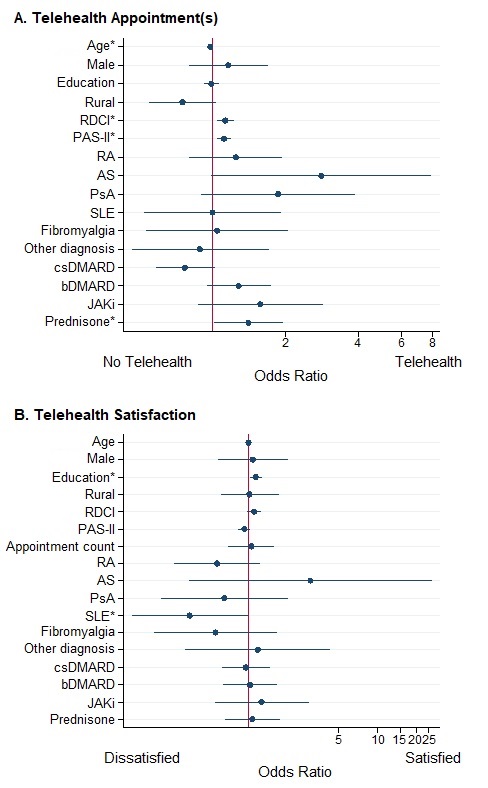Session Information
Session Type: Abstract Session
Session Time: 10:00AM-10:50AM
Background/Purpose: Many health care providers replaced in-person clinical visits with telehealth visits or expanded their telehealth offerings due to the COVID-19 pandemic. We sought to better understand the frequency of these changes and satisfaction with telehealth appointments among patients with rheumatic diseases during the first months of the COVID-19 pandemic in the US.
Methods: The study population included participants in FORWARD, The National Databank for Rheumatic Diseases who completed a supplemental COVID-19 questionnaire between May 20 and June 2, 2020. Respondents were asked about the number of telehealth appointments they had between March 1, 2020 and the date of questionnaire completion. If they had at least one telehealth appointment, they were asked to rate their satisfaction with the appointment(s) on a Likert scale. Logistic regression models were used to identify factors associated with having telehealth appointments and with telehealth satisfaction. Respondents’ optional free text comments were qualitatively analyzed to assess reasons for satisfaction/dissatisfaction with telehealth.
Results: A total of 1,213 participants were included in this study, with 617 (51%) reporting at least one telehealth appointment between March 1, 2020 and questionnaire completion. Of those who had at least one telehealth appointment, 447 (72%) reported being “somewhat satisfied” or “very satisfied” with their appointment(s) (Table 1). Satisfaction appeared to decrease as the number of telehealth appointments increased (Table 2; Χ2 p=0.01) but this was attenuated when considering demographic and clinical covariates. Younger age, higher Rheumatic Disease Comorbidity Index (RDCI), higher PAS-II, and prednisone use were associated with having at least one telehealth appointment (Figure 1A). Lower education level and SLE diagnosis (with OA as the comparator) were associated with lower satisfaction with telehealth (Figure 1B). In the free text comments, respondents were satisfied with telehealth because it was safer, saved travel time, enabled continued access to services, and provided help with COVID-19 symptoms. Respondents reported dissatisfaction with telehealth due to technical difficulties, perceptions that telehealth visits were less useful than in-person visits, and not being able to get needed services through telehealth.
Conclusion: About half of rheumatology patients in this cohort reported having one or more telehealth appointments during the first several months of the COVID-19 pandemic in the US, and most of them were satisfied with the appointment(s). Utilization of telehealth has expanded dramatically in a short period of time, with those with the greatest need (comorbidities and high disease activity) most likely to use these services. As clinics adapt to having more telehealth visits, it will be important to ensure quality of care and satisfaction is met for populations that are most at risk.
 Table 1. Demographics and clinical characteristics of participants who did and did not have telehealth appointments, and of those who were and were not satisfied with telehealth. Values are mean (SD) or %.
Table 1. Demographics and clinical characteristics of participants who did and did not have telehealth appointments, and of those who were and were not satisfied with telehealth. Values are mean (SD) or %.
 Table 2. Satisfaction with telehealth appointments by number of telehealth appointments reported. Values are n (%).
Table 2. Satisfaction with telehealth appointments by number of telehealth appointments reported. Values are n (%).
 Figure 1. Factors associated with having one or more telehealth appointments (A) and with patient satisfaction with telehealth (B). OA was the comparator for diagnosis. Statistically significant covariates are labeled with an asterisk (*).
Figure 1. Factors associated with having one or more telehealth appointments (A) and with patient satisfaction with telehealth (B). OA was the comparator for diagnosis. Statistically significant covariates are labeled with an asterisk (*).
To cite this abstract in AMA style:
Wipfler K, Shaw Y, Simon T, Cornish A, Katz P, Michaud K. Utilization of Telehealth Among Patients with Rheumatic Diseases in the Early Months of the COVID-19 Pandemic [abstract]. Arthritis Rheumatol. 2020; 72 (suppl 10). https://acrabstracts.org/abstract/utilization-of-telehealth-among-patients-with-rheumatic-diseases-in-the-early-months-of-the-covid-19-pandemic/. Accessed .« Back to ACR Convergence 2020
ACR Meeting Abstracts - https://acrabstracts.org/abstract/utilization-of-telehealth-among-patients-with-rheumatic-diseases-in-the-early-months-of-the-covid-19-pandemic/
